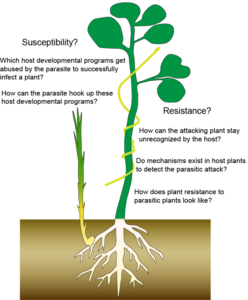RG Prof. Markus Albert
Research interests
The plasma membrane of plant cells represents a selective barrier for solutes, water, nutrients, exogenous and endogenous molecular cues and signals. Especially the latter are critical to initiate tissue- and cell-specific signaling as triggers which are specifically detected at the cell surface. How get extracellular signals perceived at the plasma membrane and how do the corresponding intracellular signaling programs get activated?
Membrane-bound receptor proteins and receptor complexes are critical to detect signals at the cell surface and to switch-on intracellular signaling cascades. Those receptors are able to recognize both, endogenous signals, e.g. phytohormones such as Brassinosteroide, and exogenous signals, e.g. microbe-associated molecular patterns which signalize danger and activate cellular defense programs in infected host plants. We focus on molecular cues, their perception via membrane-bound receptors and the activation of cellular signaling programs in the context of plant-plant interactions. We are generally interested in the…
In addition to other biotic stresses, parasitic plants pose a further threat to plants and cause crop losses, worldwide. Plant parasites directly connect to the vasculature of host plants thereby stealing water, nutrients, and carbohydrates consequently leading to tremendously reduced biomass and losses in seed yields of the infected host plants.
The major goals of my research team are the elucidation of molecular mechanisms during the interaction of parasitic plants with host plants. Thereby we are following two major routes and try to address both phenomena susceptibility and resistance (see overview in Fig. 1). In susceptible interactions, the parasitic plant hooks up certain, yet unknown, plant developmental signaling pathways to finally abuse it by redirecting and withdrawing nutrients, water and carbohydrates. Up to date nearly nothing is known about how such connection is established while the infection stays unrecognized by the parasitized host.
Complementary, working with host plants that are resistant to an infection by a parasitic plant, we aim to understand this stress-avoidance on molecular level. Does plant resistance against parasitic plants function in a similar manner such as known for plant resistance against microbial pathogens?
In terms of applications, steps to understand the molecular mechanisms behind both susceptibility and resistance, together with the successes in recent breeding efforts will provide fundamental knowledge to further generate resistant crop plants.
Read more details:
